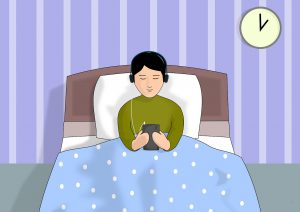What time did you go to bed last night? Wow, that’s late! And what were you doing up so late? If you’re like a lot of people, you might struggle to answer that question, or your answer might be, “not much,” or at least not anything you needed to be doing at 2 am. Maybe you were scrolling through social media, reading, binge watching your favorite show, or any number of things that are more enjoyable than the work, chores, and childcare you were engaged in all day.
Now, don’t get us wrong, we’re all for “me time,” but if it comes at the expense of your much-needed sleep, it can actually start to seriously affect your mental and physical health.
So if you know it’s not good for you, and that you should be all tucked into bed at a reasonable hour instead of firing up the online shopping apps at 1 am, the question becomes not what were you doing last night, but why were you doing it? You might be engaging in what’s become known as “revenge bedtime procrastination,” and you’re not alone.
Revenge Is a Dish Best Served…Sleepy?

So what can revenge and sleep possibly have to do with each other? Who or what are you taking revenge on with your bedtime? Well, ultimately, you’re only hurting yourself, but the term itself refers to taking “revenge” on the hectic daytime schedule that keeps you from doing the things you’d rather be doing.
The “procrastination” part of the phrase is nothing new to those who study sleep (“bedtime procrastination” first came up in a journal article in 2014), but the addition of the “revenge” concept is. This idea reportedly comes from China, where some workers’ notorious “996” schedule of working from 9 am – 9 pm, 6 days a week prompted people on social media to begin using the Chinese expression, “bàofùxìng áoyè,” which roughly translates to “retaliatory staying up late,” or, as we have begun to call it, revenge sleep procrastination. Journalist Daphne K. Lee popularized the term, when she described it on Twitter as when “people who don’t have much control over their daytime life refuse to sleep early in order to regain some sense of freedom during late-night hours.”
In other words, as Lee Chambers, M.Sc. M.B.Ps.S., an environmental psychologist and well-being consultant, puts it: “One of the significant causes of revenge sleep procrastination is where our current working culture intersects with our personal and leisure time expectations in our p.m. bookend. The desire to gain a level of personal freedom drives a desire to stay awake beyond a time that will provide an optimal level of sleep.”
So what’s causing people to engage in this behavior is not just simple lack of time during the day (I mean, we would all need at least 27 hours a day to get everything done, right?), it’s also the stress of not having a moment to ourselves, and the difficulty of finding time to detach from our work or parenting. For example, if you’re coming home from work at 8, eating, showering, and then getting ready to start the cycle all over again, or if you’re looking after another human all day, and are almost never “off duty” until late into the evening, you’re not getting any time to do anything for you – or any mental space. As Ciara Kelly, a lecturer in work psychology at Sheffield University’s Management School, explains, we all need time to mentally distance ourselves from our days: “People are stuck in a Catch-22. When they don’t have time to detach from their work before they go to sleep, it is likely to negatively affect their sleep.”
When Is It Revenge Sleep Procrastination?
Just staying up late sometimes doesn’t necessarily mean you’re engaging in revenge sleep procrastination. While this is a very new field of study, researchers who are looking at it suggest that the following three criteria need to be met for it to be more than just a few late nights:
- The delay in going to sleep means you’re sleeping less overall (in other words, you’re going to bed much later, but still need to get up at the same time in the morning)
- There is no “valid” reason for going to bed so late, like an illness or an external event
- You know that delaying your bedtime will lead to negative consequences, but you do it anyway
The thing is, research suggests that those who engage in this behavior actually want to get more sleep, they are just failing to do so, otherwise known as an intention-behavior gap; they also know that it’s bad for them, but they can’t help it. So who’s doing it? And are you at risk, or already engaging in this behavior?
Who Is Most Likely to Do It?
Anyone can pick up this habit, but the small amount of research that’s been done on revenge bedtime procrastination does give us some insight into who’s most likely to do it. For example: 
- Research suggests that women and students are most likely to engage in revenge bedtime procrastination; in fact, a Polish study indicates that “the chance of severe bedtime procrastination is more than twice as high for females than for males.” This might be because other studies have shown that women experience more stress than men, but if you’re a busy mom with a mountain of extra unpaid labor on your plate, you probably have a very good idea of why women are more likely to try to reclaim time for themselves late at night, no matter how unhealthy it might be!
- A study from the Netherlands found that the more a person had to “resist desires” during the rest of their day, the more likely they were to be a bedtime procrastinator.
- Millennials and Gen-Zers, especially those with high-pressure jobs, or big ambitions, are also very likely to put off sleep.
- People who tend to procrastinate in general may be more likely to engage in revenge bedtime procrastination.
- Those who identify as “night owls,” or evening chronotypes, might have difficulty shutting themselves off at a reasonable hour, even if they have to get up early in the morning.
The Effects of Sleep Deprivation
While it can be hard to give up that feeling of control over your time and freedom that sleep procrastination gives you, it’s important to recognize how bad it actually is for you. Lack of sleep night after night will lead to sleep deprivation, which in the short-term can cause issues like:
- Decreased attention span
- Impaired memory
- Faulty decision making
- Increased risk while driving
- Stress, anxiety, and irritability
- Weight gain
In the longer-term, sleep deprivation can raise your chances of some pretty serious health problems, like:
- High blood pressure
- Heart disease
- Obesity
- Diabetes
- Weakened immune system
- Hormonal issues
- Chronic pain
- Mental health issues like depression and anxiety
All of the above should hopefully convince you to hit the hay at a more reasonable hour; if you’re feeling skeptical that you’ll be able to change your ways, there are some strategies you can try to get you started on a healthier path.
What You Can Do
First of all, if you’re feeling sleep deprived, don’t stress about it – as we’ve seen, stress is one of the number one enemies of sleep! According to therapist Karl Rollinson, “the number one thing is to accept it and not fight it. Acknowledge that it won’t last forever and try not to stress about it. Like any problem in life, it needs to be managed. This means factoring in more time to complete tasks, appointments, and engagements.”
So what can you do? In the short-term, if you’ve had a late night and are feeling rough around the edges, get your body moving throughout the day – taking a walk in the fresh air can work wonders. In the longer-term, though, you’ll have to work on finding ways to carve out mental space for yourself, so try strategies like these to handle daily responsibilities without losing yourself in the process:
- Pencil in down time – It might sound silly to schedule in rest, but think of self-care like any other important appointment, and put it on your calendar so it actually gets done!
- Start small – If you’re worried about falling behind on your daily tasks, give yourself small 10-15 minute chunks throughout the day to decompress, which will make you more productive in the long run.
- Include things that are important to you – When you take breaks, use them to do things that really feel good to you, or lift you up, like contacting a loved one or getting out in nature.

- Write it out – If you’re having trouble settling to go to sleep, try journaling: A study from 2017 found that jotting down the thoughts, feelings, and experiences that stood out throughout the day can effectively reduce both mental and physical symptoms of anxiety. As Karl Rollinson suggests, “If you still can’t get to sleep because of an active mind, then get up and write down all your worries and anxieties. I call this downloading. You are effectively giving your thoughts physical form and organizing them — tidying up the mess in the attic, so to speak.”
And don’t forget, while you’re practicing some self-care, to also practice good sleep hygiene:
- Remove all screens from the bedroom, and stop screen time at least an hour before bed
- Keep the place where you sleep cool and airy
- Stick to a regular bedtime and wake-up time
- Avoid caffeinated beverages after the morning
- Skip big late-night meals
- Have a relaxing bedtime routine, including a warm bath or shower
Ultimately, we all need some distance from our daily responsibilities and space to mentally detach, as well as to have time to do things that are meaningful to us- but the best time to fit that in is not after midnight! If you are engaging in revenge bedtime procrastination, and you’re not getting the sleep you need, you’ll only end up in a vicious cycle of exhaustion, stress, and lack of productivity. So set boundaries with work and daily responsibilities, carve out meaningful time for yourself – and get yourself to bed!



